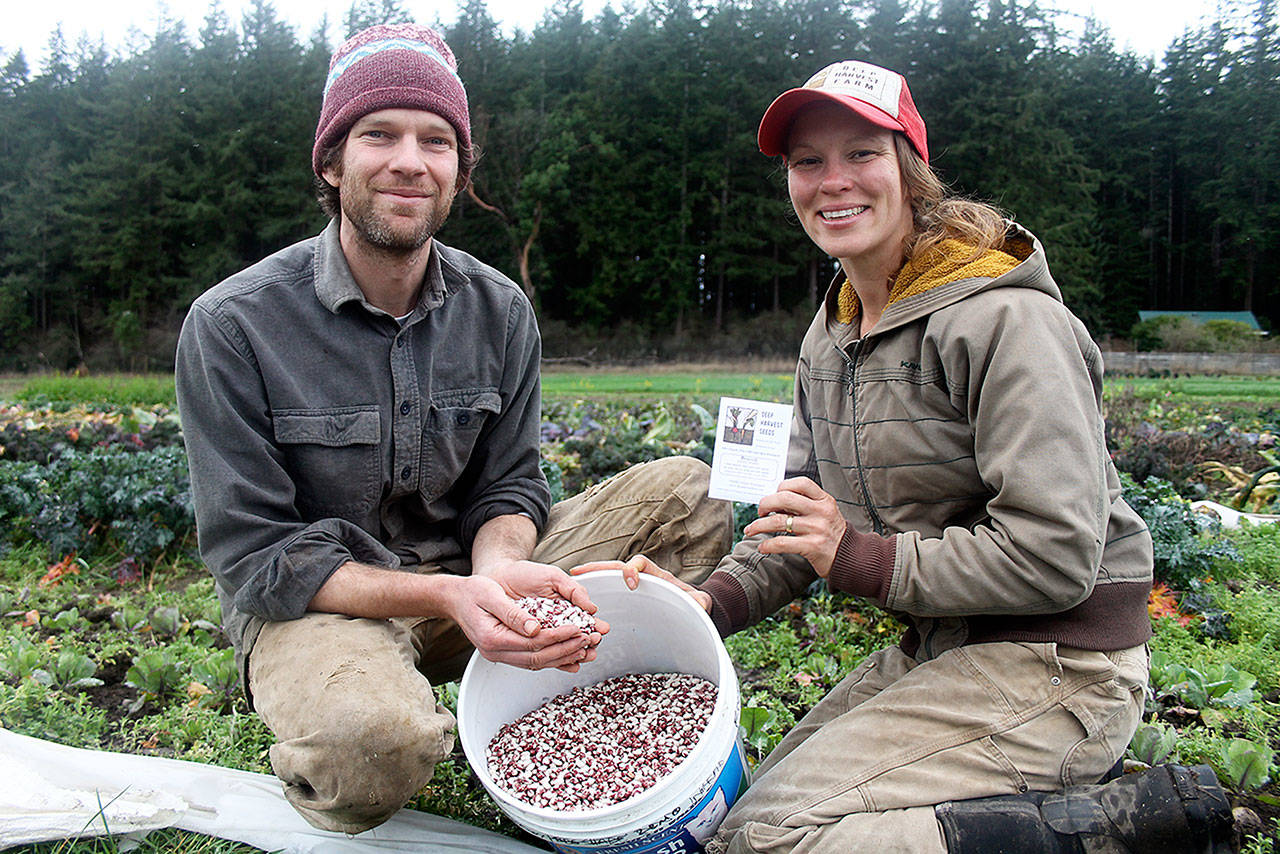The growth of Deep Harvest Farm has been measured and intentional.
Owners Annie Jesperson and Nathaniel Talbot have spent the past four years slowly increasing the output of their organic, non-genetically modified and open-pollinated seeds. When they found themselves with far more seeds than they could sell locally and regionally, they decided it was time to make a step up. They enlisted the help of their friend and Langley-based e-commerce consultant Matt McDowell to build an online store.
Now their seeds are making their way across the country.
Their website, deepharvestfarm.com, offers more than 80 varieties of vegetable, flower and herb seeds. Some of what they sell cannot be found anywhere else but Whidbey Island, such as their own Island Market Broccoli.
They started taking orders Feb. 1 and have shipped as far as Minnesota.
“We’re really excited about it,” Jesperson, 36, said. “We have a lot more seeds than we are able to market locally at this point. We really feel good about the products we’re offering and we’re excited to offer it to more people.”
Jesperson said it’s common for seed companies to broker most if not all of its own seeds. But, there’s been a recent uptick in smaller, farmer-owned seed companies that grow the majority of its own seeds.
Deep Harvest Farm is modeled after companies from around the region, including Bellingham’s Uprising Seeds and Adaptive Seeds from Sweet Home, Ore. All three companies grow most of its own seeds, but also buy some from a network of regional, organic seed farmers.
It’s this approach that sets the smaller comapnies apart from other seed companies, Jesperson said.
“It’s pretty rare in the marketplace and I think that’s something makes us special,” Jesperson said.
Jesperson and Talbot came to Whidbey Island from Portland, Ore. in 2011. They learned their craft at the Greenbank Farm Training Center.
They’ve found the Pacific Northwest to be a prime area for seed growing. Talbot, 34, said cool weather in the spring allows plants to grow slowly with big frames before producing seeds. Rain is also sparse from August to September during a “quintessential” time for harvesting seed.
“For dry-seeded crops, the Pacific Northwest is ideal,” Talbot said.
Deep Harvest Farm works hard to maintain its certification from the Washington State Department of Agriculture (WSDA), following rigorous requirements that encompass everything from healthy soil techniques and the avoidance of synthetic pesticides, herbicides and fertilizers.
Seeds are typically in the ground two to four times as long as a vegetable crop. Talbot said non-organic seed companies will often use synthetic fertilizer, herbicides and pesticides to fend off disease and other risks the seeds are exposed to during that time. He said everyone has different ideas about why fertilizer, herbicides and pesticides are bad for humans, but the prevailing consensus is that it’s often linked to carcinogens. He said there are also known effects on the environment.
It’s a method Talbot and Jesperson never plan to use.
“The environment on an organic farm is most likely similar to the environment in your organic garden where you’re going to plant those seeds,” Talbot said. “Whereas if you buy conventional seeds grown with synthetic fertilizer and pesticides, they’re propped up with all these things that you’re not going to be able to use on your garden or not going to want to use. There’s a lot of organic gardeners in the area that have a value system where they’re not interested in those things.”
The price is often bumped up slightly for organic seeds compared to conventional seeds, but Jesperson said it’s justified because they are better quality.
They’ve gained a reputation on Whidbey Island for quality seeds, according to one of the co-owners of Coupeville-based Three Sisters Market. Jessica Hart is optimistic they’ll hold up well on the national market, and that people will cherish a link to Whidbey Island even if they’re far away.
“I think it’s a very smart move of theirs to go online and sell online to other people,” Hart said. “People like the connection to the island.”
Their new challenge is online marketing.
Jesperson and Talbot are skilled at farming, not the intricacies of search engine optimization and drawing consumers to their website. McDowell, their friend, helped equip the website with components that will help increase Deep Harvest Farm’s visibility online.
“I think we zeroed in on a few things that make them more or less unique,” McDowell said. “It made it compelling for why people should buy seeds from them and not others.”
Jesperson said conquering the web will be an ongoing challenge, but she says their business is exactly where it wants to be.
“It’s been super exciting and fun to experience consistent growth over these past few years,” Jesperson said. “But it hasn’t been beyond what we can handle, just because we have been pretty intentional with what we’ve taken on.”
An earlier version of this story contained several errors. It incorrectly stated that Deep Harvest Farm grows every variety in its online catalog. It bought some from Bellingham’s Uprising Seeds and Adaptive Seeds from Sweet Home, Ore. It also incorrectly stated that Uprising Seeds and Adaptive Seeds did not grow its own varieties, but rather bought them from other farmers and placed them under its regional brands. Both companies grow the majority of its own seeds and buy the rest from organic seed farmers from around the region.



